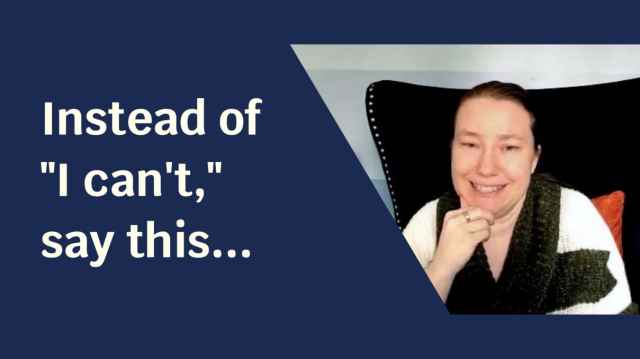
Do you get stuck?
I want to talk for a moment about the phrase “I can’t.” It’s interesting that we often use the phrase “I can’t” to describe things that we are technically physically capable of doing. We have track records of actually having done this type of thing in the past, but it just feels hard, it’s overwhelming, or we don’t want to do it. We’ll say “I can’t”, when we actually mean something else.
It’s interesting that the human brain doesn’t differentiate between true thoughts and untrue thoughts.
It’s interesting that the human brain doesn’t differentiate between true thoughts and untrue thoughts. It actually can’t tell the difference, it will react to both of them as if they’re all true. So if you think “I can’t”, sometimes you end up lying on your bed watching videos because your brain and body are like, “Well, if you can’t do that thing, I’m just going to not do it. I’m not going to try.” And it will shut you down.
One way that I found to work with this, at least as one tool among other things that have been helpful, is replacing “I can’t” with “I can and”. So it might sound like “I can write that email, and I don’t want to”, “I can write the email, and it’s hard, and I don’t know what to say, and I don’t know how to phrase this in a way that would come across as polite”, “I can write the essay, but I don’t have all the information that I need”, or “I can tell my boss that I’m not going to be at this event, but I feel guilty about it and I’m not quite sure how to phrase it. So I don’t really want to navigate this conversation.”
When you’re specific about what’s actually going on, you in some ways actually take back a little bit of control over the situation because now you know what you need to deal with. It doesn’t solve the issue, but it helps feel like you can manage it a little bit better. So that’s something that’s been helpful for me. I hope that might be useful for you, at least to some extent.




